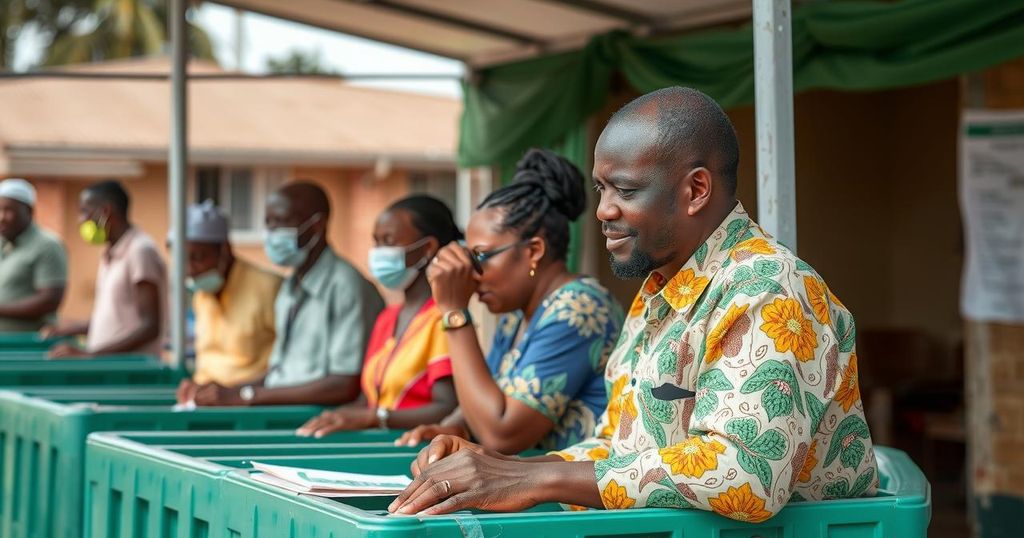Ghana’s Elections Amid Economic Crisis: A Crucial Democratic Test
Ghana has opened polls for pivotal presidential and legislative elections amid a severe economic crisis affecting public sentiment. With 18.7 million registered voters, the two main candidates, Vice President Mahamudu Bawumia and former President John Dramani Mahama, face scrutiny for their proposed solutions to the country’s economic woes. Despite vibrant election activities, pervasive concerns about inflation and joblessness overshadow the electoral process, indicating a critical juncture for Ghana’s democracy.
Polls officially opened in Ghana on Saturday for significant presidential and legislative elections that carry the weight of democratic testing in a region grappling with the effects of extremist violence and political instability. With approximately 18.7 million registered voters, Ghana faces one of the most severe economic crises it has encountered in a generation, casting a shadow over the electoral process. Historically deemed a paragon of democracy, Ghana now contends with widespread disenchantment regarding the future prospects offered by its political candidates.
Ghana, once a hallmark of political stability in West Africa, has faced deteriorating economic conditions, characterized by rampant inflation and unemployment. As highlighted by a recent Afrobarometer opinion poll, an overwhelming 82% of Ghanaians believe that the country is moving in an unfavorable direction. The current elections are marked by the candidacies of twelve individuals; however, the competition predominantly centers around Vice President Mahamudu Bawumia of the ruling New Patriotic Party (NPP) and former President John Dramani Mahama of the National Democratic Congress (NDC).
Both candidates have faced scrutiny concerning their ability to effectively address the economic turmoil. Bawumia, a seasoned economist and former deputy central bank governor, has pledged to continue the policies of the incumbent administration aimed at stabilizing the economy. In contrast, Mahama has voiced plans to “reset” the country across multiple sectors, calling for a comprehensive overhaul of governance and economic management. Despite the vibrancy of election events in Accra, including political rallies featuring music and public displays, the strain on the economy remains a pressing concern for voters.
In light of the ongoing economic challenges, which include the nation’s default on a majority of foreign debts and soaring inflation rates that have reached alarming heights, the two primary candidates have focused on presenting their programs as viable solutions. The prevalence of illegal gold mining, or “galamsey,” has also emerged as a contentious issue, leading to widespread protests and dissatisfaction with the current government’s handling of environmental and economic issues.
As Ghana navigates this electoral cycle amid profound economic adversity, the outcome will likely shape the future political landscape and potential recovery efforts. The elections, featuring 276 parliamentary seats, present a crucial intersection of citizen engagement and policy direction that could redefine Ghana’s democratic framework.
Ghana’s political landscape has been significantly impacted by a series of economic challenges that have emerged over the past few years. Once a flourishing example of democracy and economic growth in West Africa, the country is now facing high inflation rates and job scarcity, leading to widespread disappointment among its citizens. The recent elections are a response to years of dissatisfaction, and how voters perceive the candidates’ proposals and their capacity to instigate meaningful change will be critical.
In summary, the recent polls in Ghana signify a crucial moment for the nation as it confronts historical economic challenges while embracing its democratic process. With a significant percentage of the population expressing concern over the current trajectory of the country, the decisions made during these elections will be pivotal in determining both political direction and economic recovery strategies. As the candidates unveil their platforms, the electorate’s response will illuminate the path forward for Ghana’s democratic resilience and economic viability.
Original Source: www.voanews.com




Post Comment